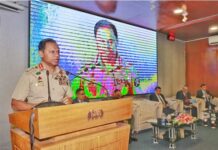A flawed tribunal opens old wounds and threatens Bangladesh’s future
IT WAS supposed to help Bangladesh come to terms with the horrors that accompanied its birth as a nation in 1971. But the “International Crimes Tribunal” has provoked the worst political violence the country has endured in the 42 years since. Actually a domestic court, the tribunal is trying men accused of atrocities in the war that won independence from Pakistan.
According to Odhikar, a Bangladeshi human-rights watchdog, more than 100 people died between February 5th and March 7th in what it called a “killing spree” by law-enforcement agencies on the pretext of controlling the violence. At least 67 people were killed after the court delivered its third sentence on February 28th. That was death by hanging for Delwar Hossain Sayeedi, one of the leaders of Jamaat-e-Islami, Bangladesh’s biggest Islamic party, for the murder, abduction, rape, torture and persecution of his countrymen.
The sentence had been expected. But members of Shibir, Jamaat’s student wing, reacted furiously. Mr Sayeedi is a fiery Islamic orator who draws bigger crowds than any other preacher in Bangladesh. Within a day of the verdict police and paramilitary forces had shot dead at least 23 protesters. On March 3rd the government deployed troops in Bogra district, north-west of the capital, Dhaka, after over 10,000 Jamaat supporters armed with sticks and home-made bombs attacked police stations and government offices.
Jamaat has been behaving more like an insurgency than a political party. Thugs have used children as human shields, attacked Hindu homes and temples and hacked policemen to death. In Jhenidah, in the south-west, they gouged out the eyes of a policeman they had murdered. Near Chittagong in the east they failed in an attempt to burn 19 policemen alive, but killed one with a pick through the neck.
The violence saps hope that a public act of vengeance against Jamaat, delivered through a broken justice system, might inspire some sort of catharsis for the country. Rumours spread on Facebook of a sighting of Mr Sayeedi’s face on the moon. Some saw this as a sign of his innocence and it mobilised pious supporters very different from the thuggish core of Shibir.
Seven more verdicts are due. Most are expected in a matter of months. Next on the list is Ghulam Azam, the head of Jamaat in 1971, accused of overseeing the setting up of pro-Pakistani death squads manned by the party’s student wing. The prosecution is seeking the death penalty for Mr Azam, whom it likened, in its closing arguments this week, to Adolf Hitler. Observers say a verdict may come by March 26th, the day the 1971 war broke out, now celebrated as Independence Day.
If, as is widely expected, the defendants are found guilty, then the entire leadership of Jamaat could be sent to the gallows this year. So too could two members of Bangladesh’s leading mainstream opposition party, the Bangladesh Nationalist Party (BNP), which governed in coalition with Jamaat until late 2006.
Mr Sayeedi’s conviction had been expected by mid-December. It was delayed when the presiding judge, Nizamul Huq, resigned as chairman of the tribunal on December 11th. Transcripts of Skype conversations published in Bangladesh showed collusion between judges, prosecutors and a Brussels-based lawyer with no official standing with the court.
The reconstituted court responded to the apparent judicial misconduct by banning public discussion of the matter. It rejected applications for retrials for Mr Sayeedi and other defendants. Of the three judges sentencing Mr Sayeedi, one had heard only some of the prosecution’s evidence, another had heard none of it. The third had heard no evidence whatsoever.
Friends like these
This seems within the judges’ rights under the tribunal’s rules. But it heightens the impression of a rush to complete the proceedings before an election due at the end of the year. Politically, the most significant effect of Jamaat’s violent fight for survival has been the BNP’s decision to tie its fate to that of its Islamist ally. It is now clear that if in power, the BNP would scrap the trials. Its leader, Khaleda Zia, called the killing of Jamaat supporters “genocide”, a term usually reserved in Bangladesh for the killings by Pakistani troops which Mrs Zia’s allies are accused of having abetted. So the secularism that is well embedded in this moderate, majority-Muslim country may be under threat if the BNP returns to power. India will hope it does not. It was antagonised when Mrs Zia, apparently to respect a protest strike, cancelled a meeting with Pranab Mukherjee, its president, on a visit to Dhaka from March 3rd-5th.
What began as a peaceful protest by hundreds of thousands of people around an intersection at Shahbag, in central Dhaka, demanding the death penalty for the indicted war criminals, has turned into a political battle that is splitting the country down the middle. The protesters’ initial narrow focus on accountability for war crimes soon gave way to calls for the banning of Jamaat, along with its influential banks, businesses and social institutions. With that shift, the public support the protesters enjoyed from across the political spectrum evaporated. The struggle is now framed by the BNP and its ally as a battle between anti-Islamist forces and the pious.
Foreign diplomats in Dhaka have issued polite appeals for due process at the tribunal and restraint on the streets. But they largely treat the trials as a domestic affair that is not their concern. America is further constrained because in 1971 it leant to Pakistan’s side during the war. Saudi Arabia is silent, despite the imminent hangings of the standard-bearers of its strand of Islam. India is supportive of Bangladesh’s approach. China is not bothered.
In January 2007 much of the outside world gave implicit backing to what amounted to a coup, and two years of unelected army-backed “technocratic” government. Foreigners now fret that the tribunal’s flaws mean that justice has not been seen to be done. But any attempt to intervene in Bangladesh’s judicial process would probably be met with contempt.
Source: The Economist










